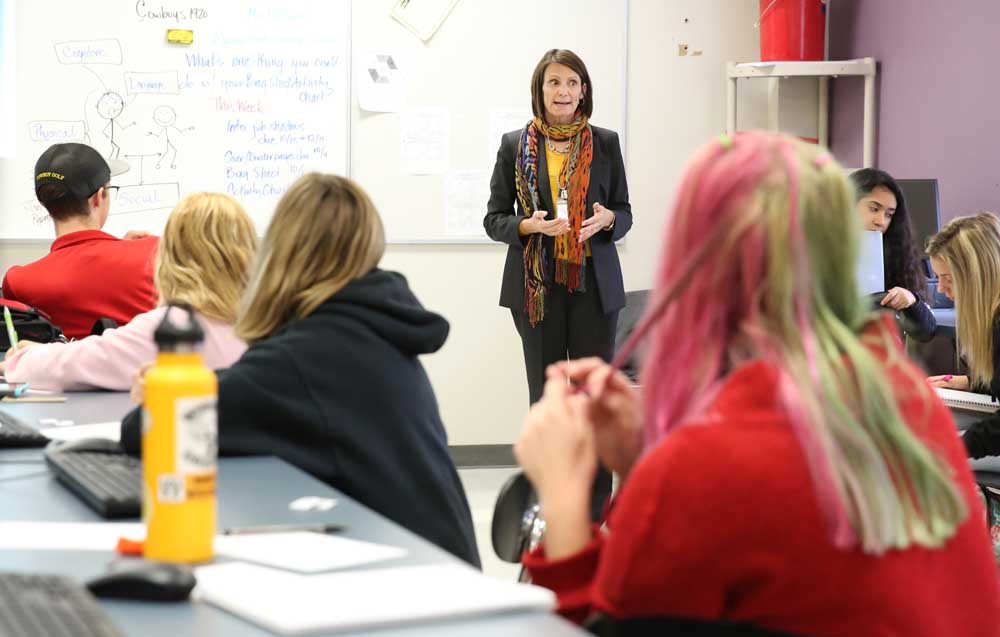Crook County school superintendent teaches high school class
Published 12:00 am Monday, October 7, 2019

- Crook County School Superintendent Sara Johnson teaches a class on human development at Crook County High School in 2019 in Prineville.
PRINEVILLE — Crook County High School’s human development course isn’t a typical class. And that’s because the person leading it isn’t a typical teacher: It’s Sara Johnson, Crook County Schools’ superintendent.
The 11 students in Johnson’s class know it’s unusual for the superintendent to teach them. But they love her personable teaching style.
Trending
They start each class sitting in a circle and sharing stories. They answer questions pulled from a hat. And each day, someone has to tell a joke.
“I think it’s really interesting that the superintendent took a chance to teach a high school class,” said sophomore Brooklyn Hamlin, 15. “She’s really an amazing teacher.”
Johnson, now in her second year leading Crook County’s schools, said she wanted to teach a high school class partly because she wanted to “learn about (her) schools at a foundational level.”
“(I want) to be in touch with the students we teach now, not the students I taught 15-20 years ago,” Johnson said. “If I’m going to talk about good teaching, when’s the last time I did it?”
Before arriving in Prineville in summer 2018, Johnson’s resume included work as an elementary school teacher in Burns for six years in the 1990s and teaching a human development course at Southern Oregon University from 2016-18 while serving simultaneously as Klamath County School District’s director of school improvement.
But she had never led a high school class before this fall. She’s enjoying it.
Trending
“They’re my favorite age group,” Johnson said. “They are really full of life and light, and everything is in front of them. I love to hear how they think.”
Human development is an introductory course into health and social science classes, such as psychology, sociology and education. Students learn how people develop emotionally, cognitively and physically over their life. Johnson said the class gives students college credit, as well as a career and technical education credit for the high school.
Johnson’s class is different from those that include the typical lectures and lab experiments.
For one, students start every day with “circle time,” which is when students sit in a circle to talk about their day with their teacher and classmates — an activity typically reserved for kindergarten and early elementary classrooms.
On a recent Monday morning, students took turns ranking their weekend on a scale of one to five. After that, students picked an icebreaker question from a hat to answer to the class — another daily ritual. Sophomore Allie Clark joked that her least favorite sport was baseball, because her brother “ruined it” for her, while Hamlin said the biggest risk she had taken was “overcoming anxiety and actually talking with people.”
Johnson said having students participate in “circle time” every day helps students get to know one another and feel more relaxed, which helps them prepare to learn.
“When kids feel that the person who’s teaching them cares about them, they’re more likely to learn the content,” she said. “When humans feel comfortable, they are better learners.”
Another regular activity in Johnson’s class adds to the casual vibe: a joke told by a different student each day.
“What do you call an alligator in a vest?” asked Lilyana Goetsch, 15. “An investigator.”
Students in the human development course praised the class’ intimate, comfortable feel.
“You can actually conversate with people and express yourself in how you’re feeling, and you don’t have to be afraid to express how you’re feeling or who you are,” said sophomore Allie Clark, 15.
“When the school says they want to teach us to learn about each other, in this class, you feel like you’re actually doing that,” added junior Kendra Mack, 17.
Johnson also said everyone in the class starts off with a 100% grade. Instead of trying to earn points, students try not to lose them, she said.
“The human brain would rather hold onto something than gain something,” she said.
Johnson gave students a comment card in the first week of class, asking for feedback on her teaching methods and the class structure. Mack said she felt it “really improved the class.”
When teaching students about certain aspects of human development, Johnson said she tries to get real-life examples to make the subject relevant to her class. She recently asked her students if anything had occurred in their young lives that they felt changed the direction of their lives. Students gave examples such as being diagnosed with ADHD and dyslexia, being a teen mom and witnessing a family member in an abusive relationship.
“I allow them to talk about their world, because that’s super important for learners,” Johnson said.
— Reporter: 541-617-7854, jhogan@bendbulletin.com








